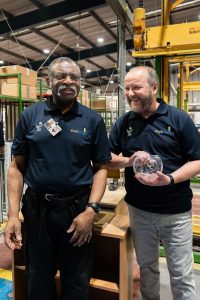
For Floyd Levermore, his job as a production operative at Shelforce means everything.
Floyd, who is autistic, has worked at the Birmingham-based window and door manufacturer since March 1985 and in that time, not only has he become a hugely important member of the team, but his life has changed dramatically.
“Working at Shelforce is so important to Floyd and has really given him a sense of pride and independence,” said Floyd’s sister, Carol. “His confidence, especially around other people, has grown tremendously and over time we have seen those changes at home and when he is speaking to people at our local church.
“It gives him focus, purpose and confidence that he can work with other people, learn new things and that he is good at what he does.”
Floyd’s success story is the perfect example of how someone with autism and learning difficulties can thrive in employment.
For many people who face the same challenges, however, such an opportunity is out of reach. And the reason says Howard Trotter, Business Manager at Shelforce, is a recruitment process that makes it almost impossible for them to impress and secure employment.
“Standard recruitment processes for people with learning disabilities are not fit for purpose,” said Howard. “Sitting in an interview situation, sometimes in front of three or more people they don’t know, and trying to answer questions on how to meet the essential criteria and sell yourself is something people with learning difficulties don’t have the confidence to do – so what chance do they have to shine?
“Floyd is brilliant in here and has contributed so much to our success, but he wouldn’t be able to take part in an interview, so it’s unfair that people like Floyd, who have all the right skills, are being held back.”
Shelforce, which is a service within Birmingham City Council (BCC), has an inclusive approach to employment, with 75% of its 36-strong team having a disability and last year received the Kings Awards for Enterprise in Promoting Opportunity (through social mobility).
Their approach involves six months paid work experience which, if successful, leads to a proper interview process with Howard, who helps them prepare, and two independent HR representatives for BCC.
Despite the success rate, which has also seen 30% of the workforce move to more senior roles, challenges with the interview and HR process remain, and BCC have recognised this and are currently working with Howard to make the process easier for people with learning difficulties to navigate and come away with a job.
“Of course, from a recruitment perspective there must be an interview, but it does seem very unfair when we know they are more than good enough to do the job as they have proved, yet we still must ask these questions that they struggle with,” added Howard.
“But BCC have been great in listening and looking at how they can help evolve the process and find alternative ways to interview people with learning difficulties, to make it as stress free as possible. They have given us two dedicated HR people to help us with the process, so it is taking shape.”
With Learning Disability Week 2024 taking place from Monday 17-Sunday 23 June, Floyd’s story is a reminder that people with learning difficulties should be seen, heard and valued when it comes to employment.
“Floyd’s amazing progress is all down to the support and working environment Shelforce has put in place,” adds Carol.
“There are so many aspects of life where his disability makes navigating and understanding the world so difficult for Floyd, but being at Shelforce gives him real freedom and an opportunity to shine.”





